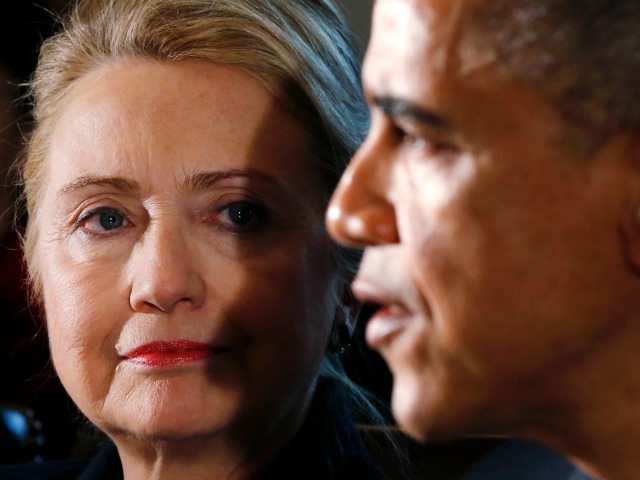While some allies want her to nudge Sanders out, others say he’s only behaving like she did eight years ago.
By Annie Karni
PHILADELPHIA, PA – In the wake of her victories in Pennsylvania, Maryland, Connecticut and Delaware, some of Hillary Clinton’s top operatives are ready for Bernie Sanders to call it quits. But Clinton’s own refusal to give up in 2008, even after she had no real path forward, remains an obstacle to ramping up that pressure.
Indeed, some veterans of Clinton’s 2008 campaign are urging empathy and space for Sanders, emphasizing that the decision to slog on is not about having a viable path forward — it’s about feeling that you’ve gone as far as you can go.
At rallies, “women would literally grab her hand say, ‘don’t you dare drop out, don’t you quit,’ ” recalled Howard Wolfson, Clinton’s former communications director, of the 2008 end game. “Your head told you the math didn’t add up, but your heart said, we’re continuing to win states, we’re continuing to draw big crowds, and it’s very hard to walk away from a contest when you have millions of supporters who are clearly still determined to help you get elected.”
Like others in Clinton’s 2008 brain trust, Wolfson said he understands why Sanders wants to keep fighting. “You begin to conclude this is a cause that’s bigger than yourself,” he explained of the campaign’s mindset in the spring of 2008. “I’m sure there are the same sets of pressure on the Sanders camp today.”
But for current Clinton officials in the trenches in Brooklyn, there has been growing frustration with the tone of Sanders’ campaign and, in particular, his bullish campaign manager Jeff Weaver, who seems to double-down on the attacks with each setback.
Rather than make any overt calls for Sanders to get out, Clinton’s top campaign officials tried a subtler approach, stressing that after Tuesday night’s losses, it will be “virtually impossible” for Sanders to catch up. And her army of surrogates have been told not to call on Sanders to drop out, but to change his tone and drop the attacks.
For now, though, he’s still fighting even as Clinton appears to have wrapped up the nomination — but hinting at a new approach. On Tuesday night, Sanders put out a statement congratulating Clinton on her wins and hinting that he would stay in through the convention to promote his driving issues: a $15 minimum wage, ending “disastrous” trade policies, and breaking up the big banks, among other bullet points.
The Clintons themselves have a philosophy of fighting on, as Bill Clinton likes to say, “until the last dog dies.” And in 2008, Hillary kept kicking through the final primaries on June 3, where she won South Dakota and Barack Obama won Montana. But that gritty philosophy does not engender sympathy for her challenger.
Frustrated by Sanders’ ability to capture the public’s imagination with a powerful message that has exposed the amorphous nature of her own, Clinton, close allies said, does not regard his decision to stay in the race through the convention as comparable to her own in 2008.
On her victory night party stage at the Philadelphia Convention Center — the venue where the Democratic National Convention will be held in July — Clinton said she “applauded” Sanders for pushing the issue of income inequality. “Whether you support Sen. Sanders or you support me, there’s much more that unites us than divides us,” she told an enthusiastic crowd of 1,300 supporters.
Sanders’ campaign has said the path ahead now depends on flipping superdelegates to his side come summer — a similar strategy to Clinton’s last ditch efforts in 2008. Back then, Bill Clinton was phoning superdelegates, reportedly trying to convince them that the country wasn’t ready to elect an African-American President. Hillary Clinton refused to make such calls, out of what allies say was a mixture of rejection and entitlement. This time, Sanders’ campaign is pointing to national polls where he still beats Clinton.
But just like eight years ago, Democrats said it is hard to see a scenario where superdelegates would go against the candidate leading in pledged delegates as well as the popular vote.
Some Democrats said they wonder if in the same way Clinton’s campaign hoped for a bombshell that would undermine Obama’s nomination — the potential existence of an alleged tape (which never materialized) showing Michelle Obama using the word “whitey” animated the Clintons in the final months of the campaign — Sanders is holding out for an outside blow to Clinton.
Mused one Clinton ally: “Is Sanders secretly banking on an FBI report?”
Like Clinton in 2008, Sanders also appears to be making a last-ditch racial argument tucked into a demographic one. It was after Clinton won Indiana on May 6 that she told USA Today, “Senator Obama’s support among working, hard-working Americans, white Americans, is weakening.”
Her comment, which she believed was stretched to contain an unintended racist subtext, is reminiscent of Sanders’ dismissal of Clinton’s victories in the South where she overwhelmed him thanks to support from African-American voters. “That is the most conservative part of this country,” Sanders said at the Brooklyn debate earlier this month. “That’s the fact. But you know what? We’re out of the Deep South now. And we’re moving up.”
But there are also differences in the candidates’ behavior in the final months of the primary calendar. Clinton developed a constituency in the final third of the campaign and came into her own, impressing people with her grit. Sanders, in contrast, has been hammering home the same message that has driven his campaign since day one and escalated his attacks as the road ahead narrows. On Tuesday, his wife, Jane, said Sanders would only release his past tax returns after Clinton released the transcripts of her paid speeches in front of Wall Street firms.
The campaign also released a heated fundraising plea accusing Clinton allies of saying that Sanders’ presence in the race he was helping Donald Trump. “Let me be clear,” Weaver wrote, “there is one candidate in this Democratic primary who Donald Trump said would make a ‘great president’ and it’s not Bernie Sanders.”
Clinton’s own history may prevent her from calling for Sanders to drop out of the race. But she can point to her own ultimate embrace of Obama if Sanders continues on the attack.
After the May primaries of Kentucky and West Virginia, 2008 veterans recalled, Clinton tried to pivot away from a contrast with Obama and focus more on a positive message.
For now, Sanders’ senior strategist Tad Devine has kept an open line of communication with the Clinton campaign. But he said he’s not ready for any negotiations.
“We decided he’s going to compete all the way through to California and D.C.,” he said. “We think that’s good — obviously how good that is for her depends on what he says. But nobody can deny the good of registering voters.”
Even Clinton’s sympathetic 2008 allies, however, said it would be critical for Sanders to give up a floor fight at the convention. “The Republican convention will devolve into total chaos,” Wolfson said, “which will have a negative impact on the perception of the part. It would be enormously beneficial to demonstrate a contrast to that.”
Clinton’s 2008 traveling press secretary, Mo Elleithee, who fielded the intense pressure to drop out, said now that Clinton can campaign as the presumptive nominee, it will be the most challenging period for Sanders’ operatives.
“I had to go to the back of the plane everyday and justify [to the press] why we were in the race,” Elleithee said. “It’s one of the toughest jobs in politics when you have to argue against math.”


















